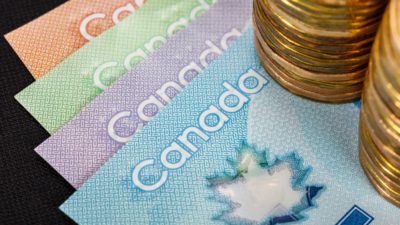Twice a month, the Toronto Stock Exchange publishes their short report, which outlines the stocks investors have most aggressively bet against.
Large companies almost always dominate this list. A short-seller of any size needs to short a large, liquid stock. If a big investor needs to short $10 million worth of something to get an adequate position size, it’s a lot easier to short 1% of a $1 billion company than it is to short 10% of a $100 million company.
Thus, it seems obvious that Canada’s largest companies would be the ones shorted the most. And, for the most part, this is true. But there’s a bit of an exception to the rule. Canada’s banks are far more shorted than companies of a similar size.
Here’s a summary of the short positions held against Canada’s banks as of December 31, 2016.
| Bank | Number of shares sold short |
| TD Bank | 82.7 million |
| Bank of Nova Scotia | 42 million |
| Royal Bank | 36.5 million |
| Bank of Montreal | 22 million |
| National Bank of Canada | 15.7 million |
| Canadian Imperial Bank of Commerce | 15.1 million |
If you add up the dollar amounts, the results are staggering. There’s $5.6 billion shorting Toronto-Dominion Bank (TSX:TD)(NYSE:TD) alone with another $3.4 billion shorting Royal Bank. In total, investors are betting against $17 billion worth of bank shares — the same securities that have made countless Canadian investors wealthy over the years.
So what gives? Why are so many investors betting against Canada’s banks? Here are two important reasons why.
Hedging
First, the boring reason. Many big hedge funds and institutional investors short shares as a way to lessen their long exposure.
Look at it this way.
Canada’s bank shares have performed exceptionally well over the last year. National Bank of Canada (TSX:NA) leads the way with shares increasing just over 40%. Bank of Nova Scotia (TSX:BNS)(NYSE:BNS) is only marginally behind. Its shares are up 36.2% in the same time period.
Canadian Imperial Bank of Commerce (TSX:CM)(NYSE:CM) was the worst performer, but it’s still up 22.8% versus a year ago.
In addition, it’s easy to argue many banks have somewhat inflated valuations. TD Bank, which has been more expensive than its peers for years, now trades at 14.5 times trailing earnings. A year ago, investors could buy National Bank shares for under 10 times trailing earnings. That’s a big difference.
The easy way to protect those gains is to sell. But that triggers a taxable event — something every smart investor tries to avoid. So an institutional investor will use a different strategy. They will short shares of a bank they don’t own, hoping to profit from a short-term sector move while maintaining the long-term position.
Housing
Many investors shorting Canadian banks are doing so for a much more sinister reason. They believe Canada’s real estate market is in a bubble that will end very badly. There are reports that at least $1 billion worth of shorts are from U.S. investors betting on a housing collapse.
This is a bet many hedge funds have been making for years with terrible results. Although markets like Toronto and Vancouver are very expensive, prices keep going up. There’s just too much demand for prime real estate in both markets, although there are signs Vancouver may be softening.
Besides, if I were looking to short Toronto real estate, I’d do so through Home Capital Group Inc. (TSX:HCG), not through a large bank with a solid balance sheet and significant U.S. exposure.
The bottom line
Much of the $17 billion that’s currently short Canadian banks is from hedging activities, which is prudent as markets continue flirting with all-time highs.
The far more interesting angle is from the shorts betting against Canadian real estate. While I agree certain markets are quite overvalued, I’d caution anyone who’s trying to bet against the Canadian banks. It just isn’t a good long-term bet, even if housing is crazy. As we’ve seen, it could be years before the bubble finally pops, if it does at all.







